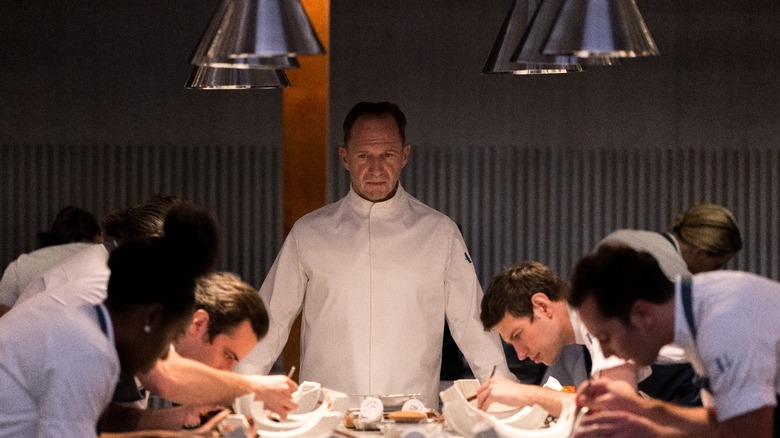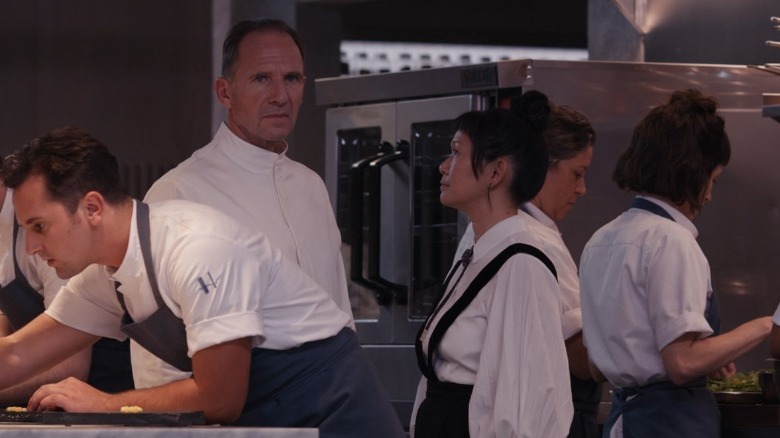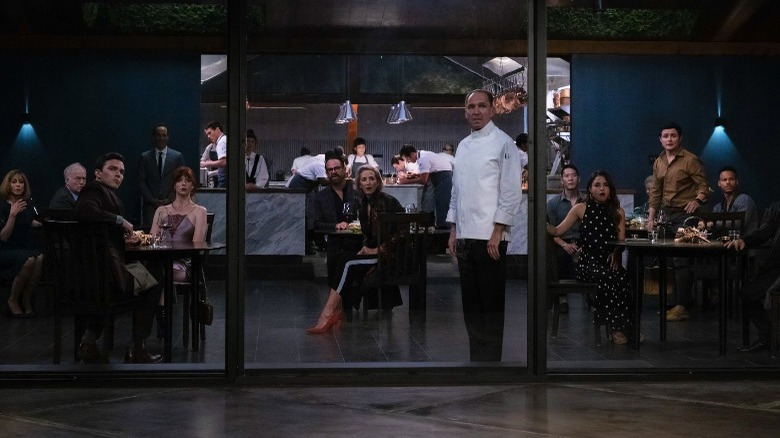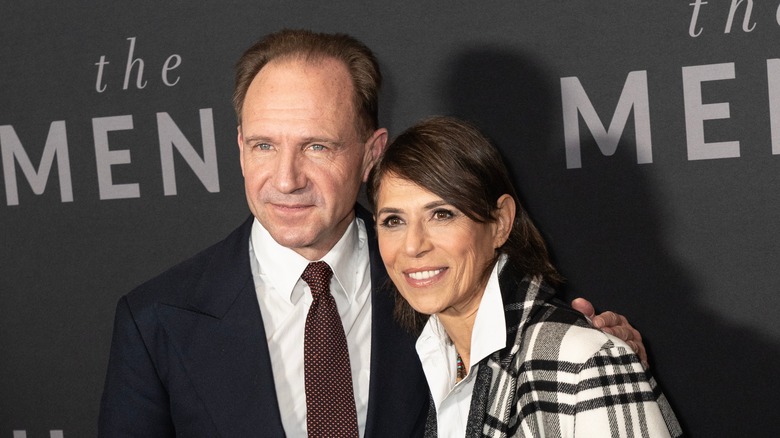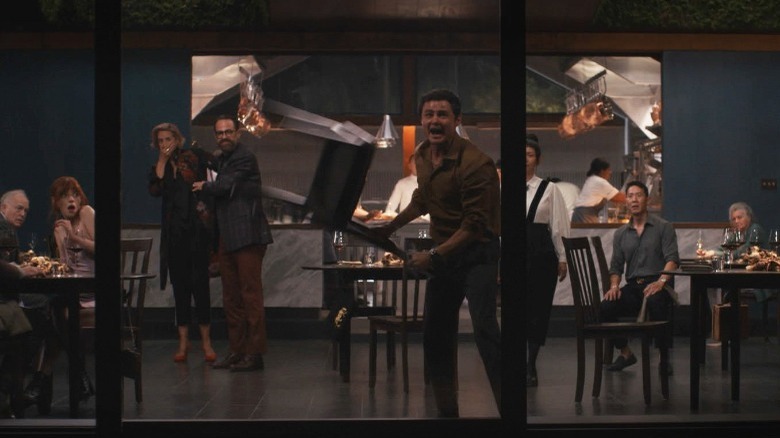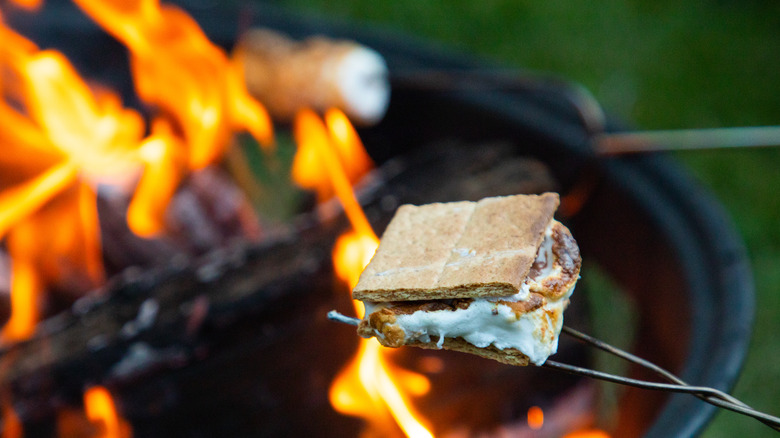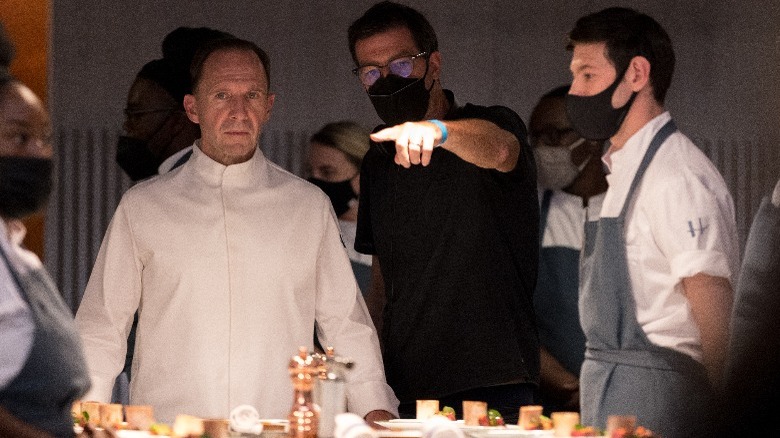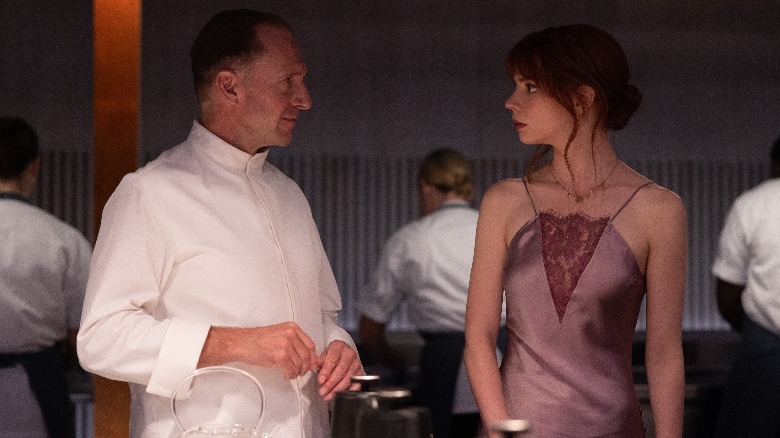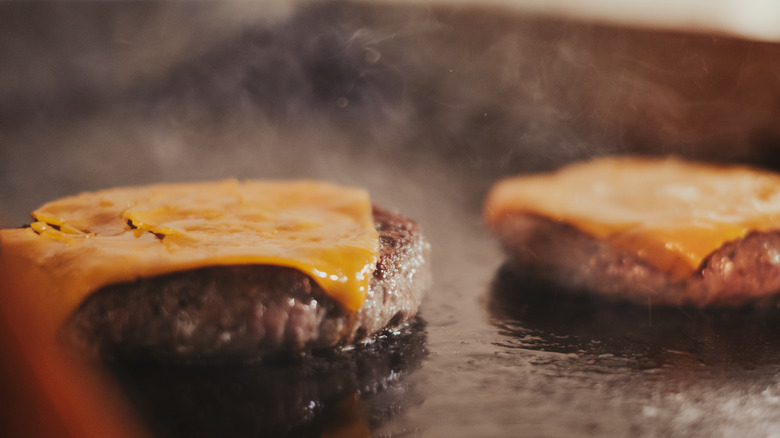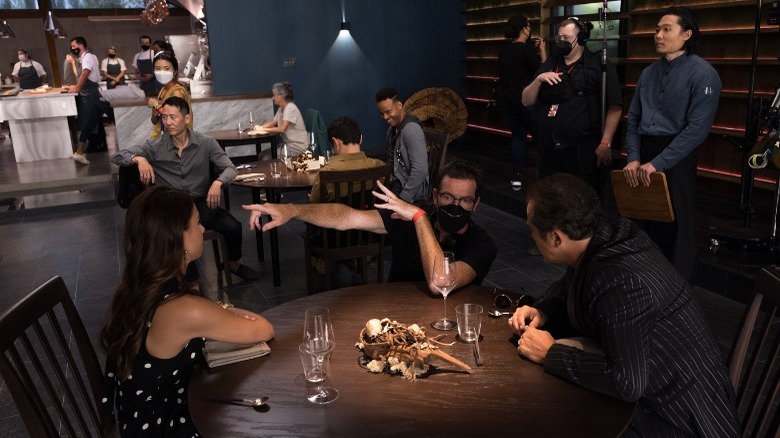Ethan Tobman & Dominique Crenn Give Us A First Look At The Menu - Exclusive Interview
There is nothing mundane about "The Menu," starting with the fact that the dishes you're asked to admire on screen — horrified, amazed, enchanted? — are not prop food. The food is probably Michelin-quality, at least if the movie's culinary consultant, Dominique Crenn, had anything to do with it.
Consider, too, the kitchen. "The Menu" might be the most accurate culinary movie to hit the big screen yet. As set designer Ethan Tobman exclusively told Tasting Table, the movie's kitchen is astoundingly functional. Tobman — whose work you're familiar with if you've seen any of Taylor Swift's recent videos — superseded mere functionality. If you watch the black comedy closely enough, you'll find multiple nods to the legends of the food world in the set of "The Menu."
Crenn, for her part, is re-doing her three-Michelin-starred restaurant after working on the A-lister packed movie. The chef was so impressed with how precisely Tobman understood the pandemonium in Chef Slowik's (Ralph Fiennes) head that she recruited Tobman to design her own real-life place. The new Atelier Crenn, set to open in February 2023, is as much a reflection of Dominique as "The Menu's" set mirrors Ralph Fiennes' characters' emotional odyssey (Stay tuned!)
While we're talking about Fiennes, you should know that Crenn instructed the Tony award-winning actor on how to transform into the half-haunted artist, half-cult-leader who'll intoxicate you on-screen. She also taught Fiennes how to make "the cheeseburger." She'll teach you, too, if you stick along for the ride.
Dominque Crenn thinks The Menu's Chef Slowik is a nice person
Dominique, you, like Chef Slowik, believe that every dish should tell a story. Is Slowik's nightmare your own?
Dominique Crenn: I don't look at [it] this way. Psychologically, he's a little bit different than I am, but I also understand where [he] could blow up and explode. That's what attracted me to the movie, because [the movie is] also a psychological way of looking at things and [it] shine[s] a light on [where] that type of person can go, mentally. We are talking about mental health, we're talking about pressure, we're talking about the craziness, the perfection, the ... expectations of others.
Is it my worst nightmare? No, but I get it. I feel very close to it, but I'm a nice person. He's a nice person when you think about it. He's an artist. It's beautiful. My worst [nightmares are] the people from the outside — the blogger, the influencer. I get that [part of the movie].
Chef Slowik's kitchen is a place of haunted worship
I want to come back to that! Ethan, here's a question for you. The restaurant that you designed here gives off part military barracks vibe, part church steeple vibe. Having dined in Michelin-star restaurants in the past yourself, is that in any way a reflection of what you felt or observed?
Ethan Tobman: Everything that I do is motivated by character. I can't design anything unless I understand who the person is, and even if I don't agree with them, I have to feel like there's a part of them in me, or I can't design. From there, I start designing, and I don't know if I look at architecture to imitate it. I look more at how emotion inspires it.
The reason I'm not an architect is because I'm not interested in creating spaces and imposing them on people. I'm interested in emotional architecture. I take what's in someone's head and I create a world to parallel it. If Slowik is inspired by the island, I want to use every material the island has to offer. He'll harvest that ecosystem to create the island.
If I want to feel, as you mentioned very intelligently, that the kitchen is a place of worship, I'm going to design it like a church. I want there to be a cross on the back wall. I want him to feel like he's sermonizing from the pulpit. I'll build his floor a little higher and all the chefs a little lower so they look like they're genuflecting to him because they're in a cult. Similarly, I want to keep the front of house and back of the house very open.
[The] filmmaking allows for the most visual depth, but there's something off about it. There's something very controlled. Where I landed was the idea that chef is inspired by nature's perfectionism, but haunted by it. In effect, he wants to destroy it.
Dominique: The contradiction.
Ethan: Yeah, the contradiction, and that's true for so many of us as artists. We want perfectionism.
Dominique: He's haunted by it because people are haunting. It's interesting. When you say "like a Michelin star restaurant" — yes, some of them probably are very military-like [atmospheres]. Not everything is like that. Actually, Crenn is not like that. As a matter of fact, we're re-doing Crenn, and it's going to be redesigned.
Why Dominique Crenn is re-designing her restaurant after The Menu
Tell us more!
Ethan: This is the great surprise of this movie for both chef and I. When she walked into the restaurant [on-set], she turned to me and said, "Tobman, I want you to redesign my restaurant." I thought, "Oh okay. Yeah." Six months later, she called and said, "Okay, so when do we start?" [We're] opening in February.
Dominique: This idea, the beauty that when I walk into the set and I read the script, I could totally understand [the set]. [Ethan] got the character and it was so amazing to have someone like Ethan to create the experiences from the design and the material. That's why the movie's going to be amazing, because everything is connected.
I have to go back to the design of the restaurant. What can we expect?
Ethan: Everything is inspired by this woman, [her] experience from childhood to looking into the future to telling the story of things that we already know and things that we don't. It's very personal, isn't it?
Dominique: [It's] personal the whole time.
The customers Dominique Crenn will kick out of her restauarant
Dominique, there's another half-personal thing I see in the movie. We see a taco scene in which a chicken thigh is served. What's the inspiration for that, especially because you, yourself are opening a taco restaurant, although plant-based?
Dominique: No, [I had] nothing to do with it. It was [the result of a collaboration] working with Ethan, Mark, and the writer came and brought the script. [We were] also working in what they wanted to do. It happened that [way] ... I tried to execute something they wanted me to execute. [It had] nothing to do with my own life. I could make tacos for my girls everyday.
Let's talk about pet peeves, because we get a microscopic view of those in "The Menu". We get the foodie taking pictures, we get changes requested to the menu, complaints about a broken emulsion. What are the things that irritate you most about customer requests or behaviors in a restaurant?
Dominique: There was one story [that] was a few years ago. Two guys [went] to my restaurant with a big bottle of magnum cherry port wine. They put it on the table and then they start to diminish and [were] bullying one of my servers. Furiously, I had to go back to the table and I say, "You guys take your ass out. You're not welcome in my home."
A disrespecting customer, [who] comes to us and can't respect a person of my team or myself is not welcome. I don't have any problem with say[ing] "Get out." [My biggest pet peeve is] being disrespectful. Food is subjective. Not everything might not be [to everyone's] liking. We can [serve] a plate or dish — [someone might say], "It's too salty." [That] doesn't bother me. I understand it, but humanity in my restaurant [is vital]. If you [are] not a good human and you walk into my [place], that is the only thing that drives me crazy.
Ethan: Because it is your home.
Dominique: It's my home. I will take action, but I will not kill them.
Dominique Crenn and Ethan Tobman debate S'mores
Given how things end in "The Menu," will either of you ever eat s'mores again?
Ethan: I don't know if I ever had a s'mores before.
Dominique: Yeah, we had a s'more. It's delicious. One mini s'more.
Ethan: Maybe I had it while – I'm Canadian. I didn't grow up with it.
Dominique: I didn't grow up with that, but my pastry chef, Juan, had this s'more on the menu [at] one point. It's fun. [We] put s'mores on the [menu], but [the concept is] weird to me. It's like [a] piece of sugar, burned.
Ethan: This isn't a disrespect to American cuisine, because I've become an American citizen, but Americans will turn anything into a sandwich that they can.
Dominique: I'm sure, but that's the beauty of the –
Ethan: The idea of a sandwich that's a dessert for my brain, and ... [the] designing of s'mores [in "The Menu"]. That was by 30 by 60 feet. That was the thing I wouldn't mind doing again. That was really fun!
Dominique: Yes, that was fun.
The first thing Dominique Crenn said to Ralph Fiennes
Dominique, one of the things that Ralph Fiennes says is that you train him how to act in the kitchen — from his body language to his facial expressions. What chefs or experiences did you draw on to help mold his character?
Dominique: I got [it], not from a chef ... The first thing I [said to him was], "You are the director ... this is your symphony. Everyone is as important that is [participating], but you are the one that is going to direct it." When you have to have your own confidence, you have to bring confidence to [everyone], and [you have to have] the intensity, [the ability to] make sure that every note goes together. From the start to the finish, this is a beautiful symphony.
That's where I drew [my inspiration from] and that's how we built [the atmosphere] in Crenn, too — from the idea of a symphony or movement of dancing. That was very important, to have [Ralph] understand the importance of confidence and connecting the dots with the team that he [was] running. You can see it, too. They will die for him. A conductor — in the symphony — the people that play will make sure that they please the conductor.
There is no inspiration from other chefs. [The] inspiration [comes from] music, art, detail, and it's like a character. A movie [actor] is also that way. Someone that designs also is that way. [The inspiration comes from] outside of the cooking world, about how a heart come[s] together and how you build the team around you — attention to detail, and being a team.
Details only a true foodie picked up on in The Menu
Talking about details, Ethan, you are super detail-oriented in all of your set designs, whether that's with Taylor Swift or working on the set of "Free Guy." We get all of these Easter eggs if you really pay attention. What should we be paying attention to on the set of "The Menu"?
Ethan: It's a fully functional kitchen. It's not a kitchen that is built for a movie. One of the things that we learned, and tried to be really disciplined about, was every square inch of the kitchen is sacrificed for another chair or another table at the front of the house in many restaurants. A lot of the chefs that we interviewed, a lot of the lines cooks that we interviewed, would talk about working elbow to elbow and getting home at night, and not stretching out on their beds because they're so used to working in such a small [space]. It was a really tricky game to figure out how [to] combine the practicality of filmmaking with the reality of kitchen design.
We had to be clever about making [the set] possible to shoot in. The other thing that is definitely Easter eggs here is we wanted to make a nod to certain chefs. For example, the spice wall from El Bulli, who runs an extraordinarily OCD ... catalog of spices, we rebuilt that and we put it in the freezer. Magnus Nilsson's Fäviken restaurant has a dry cellar. That was a huge inspiration to me for the dry cellar that we did, so we're making little — Grant Achatz is definitely an inspiration for the s'mores course. We're not copying, but we're nodding to certain chefs that both help us give authenticity, but also firmly establish this as a satire.
Dominique Crenn names the cheeseburger's most important ingredient
Finally, let's talk about "The Menu's" cheeseburger.
Dominque: We taught him how to do it.
How do we replicate it in that case?
Dominique: It's all about the ingredients ... [You have to use] the best ingredient that you can find out there. A cheeseburger is about cooking from here [points to heart]. It's comfort food. If you cook with love, that is going to be the best cheeseburger that you ever had in your life. Caramelize some onions, get the best meat, grind [the] meat, cook it, caramelize onions, smash the burger on the caramelized onions, put [on] your cheese, get ... beautiful bread, whatever you want to put on that.
Ethan: God, I'm hungry.
Dominique: Put that in your mouth. I [would] add some pickle.
Ethan: Yeah, always.
Dominque: You need that. You need that layering of flavor and umami, and then, that's it. It's pretty easy to do.
Ethan: I'm absolutely starving now.
Dominique: I know. It's like I say: life is all about the ingredients that [we] use in cooking. Not [only] cooking — it's [about] what [Ethan] uses [as] ingredients to do his art. If you don't use the right ingredient and it doesn't come from [the heart], [it's a] zero. No good. Bye bye. It's true!
Yes, Dominique Crenn ate the cheeseburger
Did you try the cheeseburger at the end?
Ethan: Hell yeah.
Dominique: Yes, of course. We were cooking in the back of the kitchen, and he was cooking with us, and he's amazing. I'm telling you, Ralph is amazing. We also worked with Ms.–
Ethan: Kendall [Gensler]. She was our food stylist. She was incredible working with Chef's team.
Dominique: Which was something new for her to do, because the food was edible food. We didn't nix the menu. We didn't want [it to] be prop food.
Ethan: [We also had] John Benhase, who owns Common Thread in Savannah, because we fell in love with that restaurant. You pulled people in, didn't you?
Dominique: Everybody works together, and then we can create some[thing] amazing. It was not just about us. It was about everyone.
The team, from the designers to the cameraman to the person that was probably cleaning up after that, it was incredible to work with people that [were] so passionate about the project. That's why [the movie is] going to be so successful, because each person that worked on that project was very passionate. It is [the same way with] the success of a restaurant. If your team is not passionate, from the dishwasher to the front of the house, to the person that is in the office — if there is no passion and belief in the product, then the project's not going to be great.
"The Menu," which premieres exclusively in theaters on November 18.
This interview has been edited for clarity.
